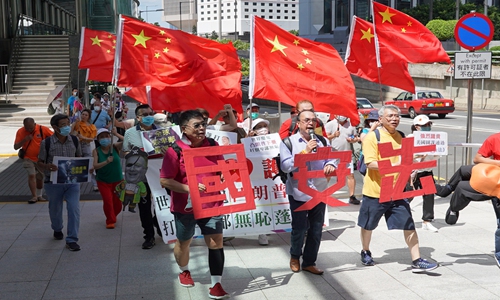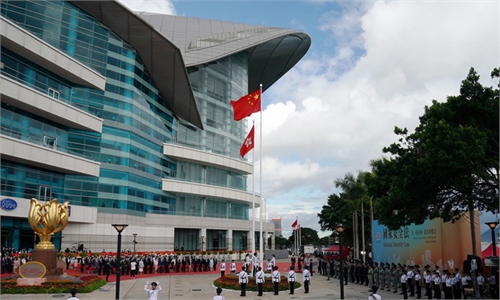
A Hong Kong association gathers at Chater Garden, Central Hong Kong, in support of the national security legislation in the city. Dozens of participants marched to the US Consulate General in Hong Kong waving the Five-Starred Red Flag and shouting slogans supporting the legislation and protesting the US' interference in China's internal affairs. Photo: cnsphoto
The heads of the governing councils of Hong Kong's eight publicly funded universities announced their support of the newly enacted national security law for the Hong Kong Special Administrative Region (HKSAR), amid celebrations Wednesday for the 23rd anniversary of return to the motherland.
Council chairmen of renowned universities such as the University of Hong Kong, Hong Kong University of Science and Technology, Chinese University of Hong Kong, all expressed their endorsed positions on the new law.
Their announcement reads that the national security law for HKSAR aims to prevent acts and activities that endanger national security, which is beneficial to maintaining the city's stability and prosperity. It is also conducive to the stable and long-term development of "one country, two systems" in Hong Kong, local media reported.
Education dignitaries in the city further noted that the law is significant in providing a peaceful environment for university education and academic research. "Hong Kong people enjoy the protection afforded by the central government, and at the same time have the responsibility to protect the security of our country," reads the announcement.
Wong Kam-leung, chairman of the Hong Kong Federation of Education Workers, told the Global Times on Wednesday that the national security law for Hong Kong will deter riots, which started last year, and will also serve as a guideline for Hong Kong's education field.
The law will assist the positive transformation of campus atmosphere, but regarding protesters' hyping and smearing, it may need more cases for education personnel to get a clearer picture of where the boundaries are, what can be done and what cannot, said Wong.
Wong said the federation he serves is currently discussing the law and will provide some materials to schools and teachers along with the federation's opinions and guidelines.
The Education Bureau of HKSAR announced on Wednesday that schools should not be used as a venue for anyone to promote their political views, nor should they incite students who have not yet completed primary and secondary education to participate in controversial and evolving political events.
The bureau said that they will think about details of how the law is enforced, so that students can understand the law and the meaning behind it.


